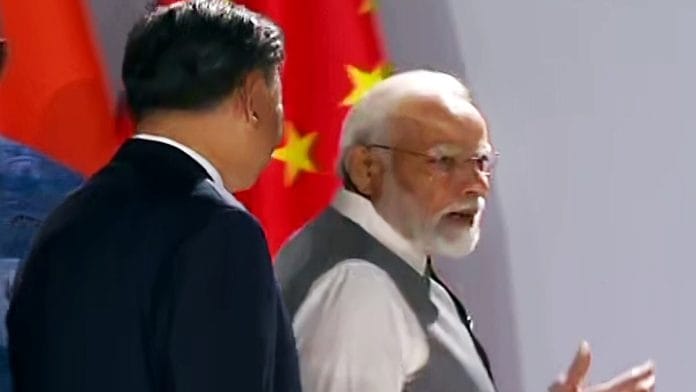The British Labour Prime Minister, Harold Wilson, famously coined the saying: “A week is a long time in politics.” Going by the rapid turn of events in the run–up to the G20 finale, a few hours may appear to be a lifetime in politics. Russian President Vladimir Putin’s personal appearance in the G20 summit in New Delhi was hotly being debated a month ago. In a recent phone call with Prime Minister Narendra Modi, Putin informed of his decision to skip the meeting “due to busy schedule and special military operations in Ukraine”. Russia would be represented by Foreign Minister Sergey Lavrov. The debate in hushed tones over the past 24 hours is about Chinese President Xi Jinping’s presence or absence at the summit. As per media reports, Xi will skip the G20 summit in New Delhi and China will be represented by Premier Li Qiang.
Last week, during the BRICS summit at Johannesburg on 23-24 August, Modi and Xi met briefly and reportedly exchanged ‘a few words’ while taking their seats for the media announcement of admitting new members into the five-member grouping. Xi was also seen clapping when South African President Cyril Ramaphosa congratulated Modi for the successful landing of Chandrayaan-3. During the meeting between the two leaders on the sidelines of the BRICS meet, PM Modi is believed to have underlined the importance of maintaining peace and tranquility in the border areas and respecting the LAC for normalisation of relations. According to the Ministry of External Affairs (MEA)’s spokesperson, the two leaders “agreed to direct their relevant officials to intensify efforts for expeditious disengagement and deescalation (along the LAC).” This was reiteration of the outcomes of the 19th round of India-China Corps Commander Level Meeting held at Chushul-Moldo border meeting point on the Indian side on 13-14 August.
All the spirit of bonhomie appears to have evaporated in less than a week’s time. Following announcements about some of the pious agreements of both sides having “positive, constructive and in-depth discussion” (on the resolution of the remaining issues along the LAC in the Western Sector) and working on confidence-building measures, Beijing has come up with a controversial map. China’s ministry of natural resources has shown Arunachal Pradesh and Aksai Chin as part of its territory in the 2023 edition of its ‘standard map’. India has lodged a strong protest against this map. Besides publishing an incorrect and provocative map, the PLA is also reported to be building bunkers and underground facilities near LAC as revealed by satellite images.
Also read: Statements from Xi-Modi BRICS meeting show India once again misread Chinese intention
Wait until G20 is over
China’s map shenanigan is clearly aimed at provoking New Delhi to react strongly. Any such reaction will divert the attention of the G20 summit from consensus on peace and progress to conflict. As it is, the Russia-Ukraine conflict has heavily undermined consensus building on certain issues and G20 activities, compelling India to spend more time on managing contradictions. The G20 finance ministers’ meeting held in February failed to agree on a closing statement because both China and Russia declined to accept parts of the statement that censured Russia’s “aggression (of Ukraine) in the strongest terms”. As a compromise formula, India as Chair released a summary, which noted “different assessments of the situation” in Ukraine within G20. In any case, since G20 is essentially an economic forum and is expected to deal with all those aspects that affect the global economy, either positively or negatively, the political resolutions can take a back seat and be taken up at some other appropriate forum.
With 17 of the 20 members of G20 being democracies, the G20 summit without Xi and Putin will be a meeting of democracies, strong and emerging economies of the West, and South South Cooperation (SSC).
As the G20 summit approaches, the focus on bilateral meetings between world leaders becomes increasingly significant, especially in the context of global cooperation and economic discussions.
G20, which used to be an annual intra-government engagement, has been projected as a massive people’s movement with a serious agenda driven by several verticals during India’s presidency. Besides the G20 undergoing a metamorphosis, India has proposed the inclusion of the African Union as a member. India’s capability to project a global agenda of peace and progress, determination to focus on SDGs by linking G20’s commitment to adopting Lifestyle for Environment (LiFE) mission as part of development paradigm, and adding grandeur and salience to G20 has clearly increased Beijing’s discomfort.
Beginning with India, the next two years of G20 presidency will be with the three countries of IBSA (India, Brazil, and South Africa) group, which is a formidable forum to deal with global economic and geopolitical issues where China and Russia have no role to play. India will continue to be part of the agenda that it has initiated as president of G20.
Beijing could have shown a little more maturity and come across as a responsible state truly interested in being part of a developmental cooperative framework. China, as is its wont, would want to be a rule maker and not rule follower and hence sees itself as an alien among democracies. It is China’s problem and not India’s. New Delhi, therefore, has its role cut out. After the G20 summit, a confident India will emerge much stronger in economic and technological areas capable of dealing with any challenge that an autocratic hegemon will throw at it. Post-G20, New Delhi will have enough time to deal with a belligerent Beijing in an appropriate manner and time.
Seshadri Chari is the former editor of ‘Organiser’. He tweets @seshadrichari. Views are personal.
(Edited by Prashant)






